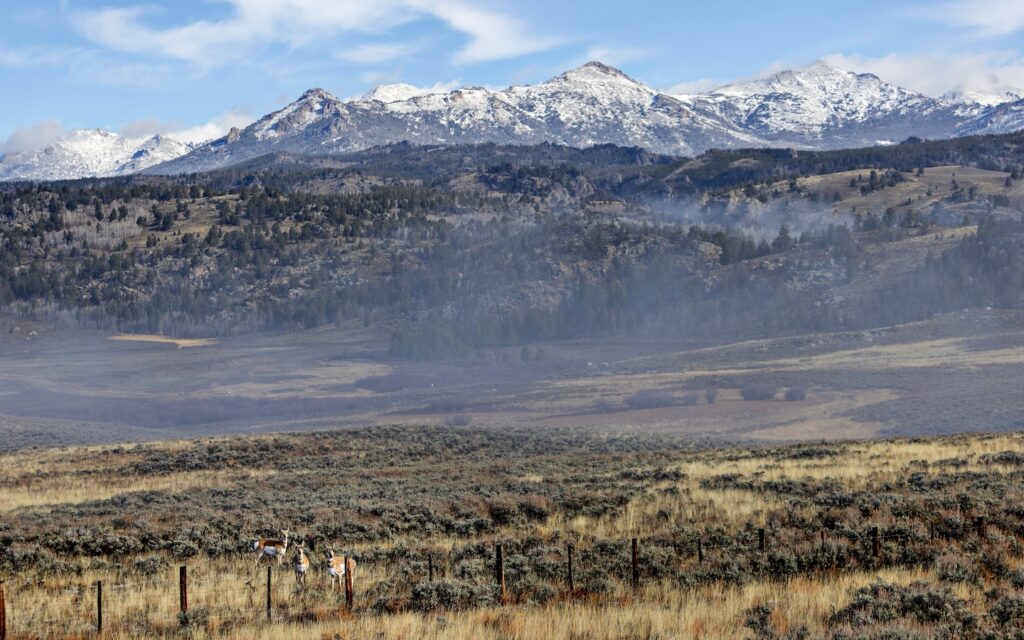The Interior Department's Bureau of Land Management, known as the nation's largest landowner, has long provided leases to oil and gas companies, mining companies and ranchers. For the first time, the nearly 80-year-old agency will be auctioning off “restoration leases'' and “mitigation leases'' to organizations with plans to restore and conserve public lands.
“Today's final rule is a powerful tool we can use to restore habitat, guide strategic and responsible development, and preserve our public lands for generations to come,” Interior Secretary Deb Haaland said in a statement. “As we continue to utilize the best science available, we will help restore balance to our public lands.”
Under President Biden, BLM has increased its focus on protecting public lands from the twin threats of climate change and development. Director Tracy Stone Manning warned that hotter, drier weather is causing longer and more intense wildfires and droughts across the American West. At the same time, development has fragmented and destroyed wildlife habitats and migratory corridors.
“We manage 245 million acres of land, and any land manager will tell you that climate change is already happening. It's already impacting our public lands.” Stone-Manning said at a Washington Post live event last year. “We're seeing it in a very clear way through these unprecedented wildfires.”
The fossil fuel industry, a perennial enemy of the Biden administration, is outraged by BLM's approach. They argued that the public lands rule is an example of overreach that curtails domestic energy production, even though the United States produces more oil than any other country in history.
Kathleen Sgamma, president of the Western Energy Alliance, which represents oil and gas companies, said her group plans to challenge the BLM rule in court. He said the policy appears to violate the Federal Land Policy and Management Act, a 1976 law that tasked the agency with overseeing the “multiple use” of public lands for current and future generations. Ta.
“We have no choice but to file a lawsuit,” Sgamma said. “These conservation leases appear to be designed to prevent energy development on federal lands.”
BLM's proposed rules, announced last year, sparked outrage, especially in Wyoming, an energy powerhouse that accounts for nearly one-tenth of the nation's fossil fuel production. Some Wyoming Republicans claim that the BLM is colluding with liberal environmental groups to keep millions of acres of land closed to development.
Sen. John Barrasso (R-Wyo.) said Thursday he plans to introduce a bill to repeal BLM rules using the Congressional Review Act, which allows lawmakers to overturn regulations with a simple majority vote. Stated. “With this rule, President Biden will allow federal bureaucrats to destroy our way of life,” Barrasso said in a statement.
Aaron Weiss, deputy director of the advocacy group Center for Western Priorities, said some Republican officials are spreading “disinformation and conspiracy theories” about the rule. He pointed to a House Natural Resources Committee hearing last year in which South Dakota Gov. Kristi L. Noem (R) argued that the draft rules would allow Chinese nationals to purchase leases on U.S. land.
Unlike the proposed rule, the final rule clarifies that “foreign persons may not hold leases.'' It also offers “restoration leases” and “mitigation leases” rather than “conservation leases,” a linguistic adjustment that appears to have been intended to avoid the politicization of the word “conservation.” Yes, Weiss said.
Mitigated leases allow leaseholders to to offset the impact of their activities. For example, ranchers whose land is degraded by cattle grazing may be required to purchase a mitigation lease during the permitting process. Ranchers can then work with local conservation groups to restore nearby habitat for the greater sage-grouse, a bird at risk in the West.
Renewable energy developers are not exempt from this rule. Daniel Murray, vice president of conservation policy at the Conservation Land Foundation, said wind and solar farms may be required to purchase mitigation leases if they are impacting wildlife or watersheds. .
The final rule also directs BLM to prioritize landscape health and incorporate Indigenous knowledge into decision-making for the first time. The latter is Haaland's top priority. Haaland is the first Indigenous person to serve as cabinet secretary and previously led a department that oversaw the removal of Indigenous people from their lands.
The Trump administration took a very different approach to managing public lands than the Biden administration. President Donald Trump temporarily moved BLM's headquarters from Washington to Grand Junction, Colorado, a hotspot for natural gas production. More than 87% of affected employees quit or retired without moving to Colorado, depriving the agency of expertise and disrupting operations.
For Trump to lead BLM William Perry Pendley is a conservative lawyer who previously advocated for the sale of public lands across the country. Although Mr. Pendley was not confirmed by the Senate, he pushed the agency to maximize oil, gas and mineral development.
Pendley said in a recent interview that if Trump were to return to office, “the priority has to be oil and gas.”


